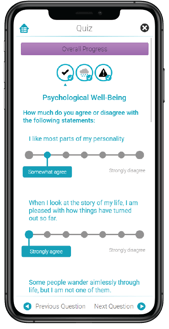If you’re ready to take your corporate wellness programs to the next level, employee health coaching is a great option – with proven results. Coaching is typically complementary to biometric screenings and/or health assessments (but not always) as these tools provide employees with a starting point from which to evaluate their current state of health and identify areas for improvement. Using this information, health coaches can help employees: develop a personalized health plan, stay on track and guide them with their health journey. Employees often report coaching as one of their most valued company benefits to help them identify, set, and achieve health goals. Health coaching can be delivered in a variety of formats including in-person, telephonic, and video conferences.
It’s a typical Monday morning and, sitting down to work, you glance at your calendar. There, tucked between your team meeting and report deadline, is a different kind of appointment: health coaching.
It should come as no surprise that for many in the modern workforce, healthcare and prevention have become part of the everyday work experience. In the U.S. a staggering 90% of healthcare costs are spent treating preventable chronic and mental health issues, according to the CDC, and employers that foot the insurance bill are paying the ever-increasing price. Many of these very serious diseases can be avoided or delayed with simple healthy behaviors, and successfully managing chronic diseases when they arise (or preventing them in the first place) can dramatically reduce healthcare costs. This is the logic supporting workplace health promotion - including health coaching.
Because there seems to be a disconnect between health care and patients. You’ve experienced this firsthand if you’ve ever had a biometric screening and, after seeing your results, felt confused or apathy about what they mean and what to do next. While many well-meaning employers hold company-wide biometric screenings (or require that employees get screened at the doctor), the likelihood that employees will take action to improve their results is very low if they don’t receive support and guidance. Patients don’t always have the education, resources, or access to care needed to make lasting changes. However, there’s evidence that the gap in health care can be filled by health coaches (Physicians Practice). A corporate wellness coach can make a big difference to the lives and health of your employees.

Just one example of the impact of health coaching is found in MercyCare Business Health Solutions (BHS), a division of Mercy Health System, which partners with CoreHealth Technolog
ies to provide wellness services to local businesses in Cedar Rapids, Iowa. Health coaching was included as a major part of these offerings and found that one-on-one health education and mentoring resulted in “the biggest positive impact” of the wellness initiative, with program success measured through pre- and post-service evaluations. According to MercyCare, coaching received “the most positive participant feedback” out of the entire comprehensive program, and they found that “coaching programs are always in demand.” So, what is health coaching, and how can you use it in the workplace?
Health coaching is a clinical intervention based on motivational interviewing that incorporates evidence-based solutions (like quitting tobacco, getting more physical activity or improving diet) into a patient’s everyday life. It’s essentially case management for patients with chronic diseases or for prevention, in which the goal is patient education, empowerment, and self-management of chronic conditions (source: The Effectiveness of Health Coaching). A trained health coach will use motivational interviewing, education, and goal setting to help the participant adopt and maintain healthy behavior. Health coaching can take place in many settings, including in a group or one-on-one; in-person, on the telephone, or online.
Health coaching is often one part of a larger worksite wellness initiative. Coaches can help make real and lasting change in employee health, and company health-related spending, by preventing, delaying, or effectively managing common chronic conditions. Corporate wellness coaches can help participants prevent or effectively manage include heart disease, stroke, cancer, diabetes, obesity, arthritis, Alzheimer’s, and tooth decay (CDC).
Health coaches help to bridge the gap between health care and health behaviors by motivating individuals to stick to their healthcare plan. Research has found that many patients leave doctor appointments confused about how to manage their chronic conditions, and that 50% of prescription medications are not taken according to physician guidelines. Coaches can be an influence toward healthcare reform by educating patients about their chronic conditions to help minimize the negative effects of illness, work toward improvement by solving the root issues of chronic disease including lifestyle factors, and to empower patients to effectively manage their own conditions in their daily life.
There are two main approaches to employee health coaching: prevention and case management.

The prevention approach is the best way to manage costs and keep expensive health issues and chronic conditions from occurring in your work force. However, for those who are at high risk or already have chronic conditions, managing those issues is the first step toward improvement.
The two approaches work together to cover an entire population. Since your workforce likely has people in both categories (with and without existing chronic issues), offering both types of coaching are ideal.
Once a participant has established which type of coaching they’ll need, the process is simple. Participants sign up for a health coaching appointment, ideally through your online wellness portal. When the time comes, they can meet with the health coach in person, over the phone, or online, providing convenient access to coaching from work or home depending on participant needs. Online coaching tools will help make the process smoother and more effective.
During meetings, the coach will guide a participant through discussion about the participant’s health issues and talk about ways to improve health through simple lifestyle behavior changes. This could include education, motivational interviewing and/or goal setting. Health coaching is sometimes done in a group setting, when the topic is something that can be enhanced through group discussion, such as stress management, or for specific populations, like pregnant women or those with diabetes. The coach may reach out to participants between meetings to check in about progress and answer any questions.
Health coaching takes a burden off physicians by focusing on education, motivation, and accountability with patients – something many physicians don’t have the time to do. For example, more than 200,000 heart bypass surgeries are performed in the U.S. each year (AHRQ). While these procedures are lifesaving, many of them are also preventable (NEJM). It’s well established that diet and lifestyle changes can prevent heart issues (NEJM), but physicians rarely have the time for lengthy discussions about lifestyle factors with patients. In fact, 42% of physicians reported not having enough time to discuss with patients how to manage their conditions.
Many people who want a more proactive approach to healthy living are becoming interested in coaching as an intriguing alternative. Coaching also helps those with existing conditions learn how to better manage their illness, and potentially reverse their condition, increasing participants’ ability to independently manage their disease.
Health coaches work as part of a patient’s overall health care team with the goal of improving lifestyle to prevent or manage disease. Improving health behaviors and implementing new, healthier habits is a long-term process that involves conversations with a health coach over periods of weeks or months. By working on the basics like improving diet, increasing physical activity, quitting tobacco and reducing stress, health coaches take a holistic, in-depth look at a patient’s life. They gain an understanding of underlying issues to improve health. Health coaches understand that each person and circumstance is different and considers each person on a case-by-case basis (T&C).
It can! According to Forbes, chronic illness among U.S. employees costs their employers more than half a trillion dollars per year. And since 60% of American adults have one or more chronic condition (CDC), if you’re not actively preventing it, chronic illness may just be a matter of time. And that can be extremely costly in terms of worker productivity, reduced quality of life, and your company’s bottom line. Health coaching can help. 
Health coaching has been shown to have a positive impact on some biometric markers, quality of life indicators, depressive symptoms, and perceived stress levels. Therefore, engagement in health coaching could produce substantial medical cost savings for employers. Furthermore, when health coaching is included as part of a comprehensive wellness initiative, it’s associated with wellness program participant satisfaction, sustained coaching participation, and health goal achievement. Health coaching has been applied successfully in numerous settings, not just the workplace, and has been shown to produce better health outcomes than wellness programs without coaching.
Also read: Corporate Health Coaching - Does it Works?
In fact, a clinical study of the effectiveness of health coaching as part of a worksite wellness program concludes that “it is evident that appropriately designed and implemented [health coaching] programs constitute an important component of the armamentarium of interventions that can be used... against potentially preventable noncommunicable chronic diseases. In the future, we and others anticipate that evidence-based [health coaching] programs... will not only be deployed with increased frequency as part of employer-sponsored wellness initiatives but will also become a standard of care in daily clinical practice.” The research tells us that health coaching can make a difference!
Ideal candidates for health coaching are those with elevated risk factors who are ready to change their health behaviors (Merrill RM et al. 2012). Research has shown that since individuals in poorer overall health are those most in need of change, they are more likely to maintain their engagement in coaching.
However, it’s not enough to give only high-risk beneficiaries access to health coaches. Health coaching as a form of prevention will keep costs down and maintain employee health. Health coaches can work with individuals on improving lifestyle factors to delay, mitigate, or entirely prevent the onset of chronic disease (SAGE Journal).
An effective way to start health coaching in your workplace is to first identify the health status of your population and pinpoint higher-risk individuals.
A health risk assessment (HRA) can help your company determine who is at highest risk for chronic illness and get an overall sense of the health of your employees. After this baseline is established, health coaches can reach out to individuals and begin working to improve lifestyle factors to prevent or delay illness (American Journal of Lifestyle Medicine).
Health assessments usually consist of the following:
Next, it’s time to talk to a health coach or nurse about the results.
Need a Health Assessment? Discover CoreHealth’s comprehensive health risk assessments
A trained health coach can decipher biometric numbers, discuss the next steps, or refer to a specialist if necessary. “Knowing your numbers,” or being aware of one’s own health statistics, is an important starting point for individuals to improve overall health. However, biometric screening results usually aren’t enough to create lasting health improvement. They need to be followed up with proper education, motivation, and accountability. That’s where a health coach comes in.
HRAs and biometric screenings can be done at regular iterations, like once per year, to monitor program effectiveness (JOEM). This is also an effective way to record treatment results year after year and evaluate the effectiveness of your health coaching vendor or your overall wellness initiative (JOEM).
While health assessments such as HRAs and biometric screenings hold little intrinsic value, they become valuable when paired with health coaching as part of a larger worksite wellness program to improve employee health outcomes (JOEM).
Since coaching services can range from lower-touch email and text coaching to higher-touch telephonic, onsite, and video coaching, costs can range. Coaching programs can also be structured to be in-bound (participant calls the wellness company to speak to an available coach) or out-bound (participant schedules an appointment and is called by their primary coach). Additionally, some programs coach solely on lifestyle while other more intensive programs will hire RNs to coach disease management.
One of our partners, Archetype Solutions Group, through their subsidiary wellness company provided us with the following costs as example.
|
Examples |
Estimated Price for Providers |
Estimated Price for Provider Clients |
|
Lower-Touch (email/text) |
$20-$35+ per hour |
$30-$55+ per hour |
|
Higher-Touch Lifestyle (phone/onsite/video) |
$25-$45+ per hour |
$50-$75+ per hour |
|
Higher-Touch Disease Management (phone/onsite/video) |
$35-$60+ per hour |
$60-$85+ per hour |
*Please Note: The exemplary prices above are not a quote for coaching services available on the CoreHealth platform.
Visit our blog to see details of the coaching programs provided by the companies listed below. You may also want to check out these helpful resources to find the right employee health coach for your workforce: Shortlister and WellSteps. You may see some overlap with these lists but also many differences. The goal is to help you find the perfect health coach!
The American Institute for Preventive Medicine (AIPM) is an award-winning provider of wellness programs and content. AIPM's HealthyLife Coaching, available via single sign-on through the CoreHealth corporate wellness software, combines two approaches to achieve better outcomes. Coaches are trained in both motivational interviewing and behavior modification to maximize results. This unique combination helps coaches to engage employees at a higher rate than using one technique by itself.
CareATC Coaching is not a one-size-fits-all approach. Coaches customize their approach to generate the best health outcomes for each individual and to address important lifestyle issues like weight-loss, tobacco use, fitness, and nutrition, while actively managing chronic conditions. Coaching programs are available through onsite group sessions, face-to-face onsite meetings, telephonic and video coaching. Using a three-phased approach - active, maintenance, and graduate - coaches can guide participants at a pace designed for optimal health outcomes.
Corporate Health Partners (CHP) provides year-round, personalized health coaching for your employees. Your company’s dedicated wellness coaches will become part of the family, working with each participating employee to help them become happier and healthier. The difference between company wellness programs that have dedicated onsite health coaching and those that do not is significant. Employees are 350% more likely to kick unhealthy habits with a corporate health coach supporting them. Because of our wellness coaches, our programs lead the industry in effectiveness.
HealthFitness coaching supports lifestyle management and condition management. They believe coaching is personal. It’s about focusing on the path towards personal wellbeing. Their coaching model allows for the development of a coaching plan based around a participant’s goals, challenges, and aspirations. • Participants select areas of interest—such as weight management, condition management, physical activity, mindfulness, financial wellbeing, and more—and work on goals. • Participants are partnered with the right, credentialed coach to develop a personalized plan to increase healthy behaviors and decrease unhealthy behaviors. • Coaches offer frequent check-ins, support and problem solving through sessions and friendly nudges (email or texted messages).
Uprise Health, formerly called HMC Health Works, offers a digitally-enabled EAP that combines curated, self-guided, CBT based modules with live and asynchronous coaching and short-term counseling via in-person, online or scheduled chat sessions—all available in one platform. Our network of 60K+ providers across the U.S. cover an array of clinical specialties, treatment expertise, cultural backgrounds, and language capabilities. Our credentialing adheres to strict NCQA guidelines, and we monitor national databases to ensure our providers are actively licensed, certified, and in good standing.
LifeWorks offers an employee & family assistance program means that your staff has access to a safe, confidential resource to manage stressful circumstances and personal issues. Around-the-clock access to professional assessments and counselling is a tremendous asset for employees navigating complex life challenges like finances, relationships, retirement and health concerns.
Dedicated wellbeing coaches at Sterling Wellness Solutions make your health goals our top priority. With multiple options for targeted outreach and personal connections, Sterling Wellness provides the individual support and motivation to meet the needs of your unique employee population. Offerings include coaching for lifestyle health, chronic conditions, and onsite coaching.
If you’re searching for corporate wellness companies that offer high-quality company wellness programs or employee health plans, then Wellness Coaches can provide your business with some of the best workplace wellbeing programs available. We offer affordable corporate health, wellness, and nutrition programs for employers and always deliver exceptional results through the power of human interaction, technology, and data analytics solutions. Our many corporate health and wellness programs and services are evidence-based using nutrition methods approved by the Academy of Nutrition and Dietetics, allowing you to provide for the health and wellbeing of employees at your workplace.
Health coaching is a common, important, and valued part of comprehensive employee health programs. Health coaches fill a gap in healthcare by providing education, motivational interviewing, goal setting, and accountability to participants. Research shows that health coaching can be effective in preventing, managing, and even reversing chronic disease, which leads to decreases in healthcare spending. There are various ways to offer health coaching to your employee population, including on-site, over the phone, or online, for maximum convenience, participation, and results.
CoreHealth by Carebook. is a total well-being company trusted by global companies to power their health and wellness programs. Our wellness portals help maximize health, engagement, and productivity for over 3.5 million employees worldwide. We believe people are the driving force of organizations and supporting them to make behavior changes to improve employee health is in everyone’s best interest. With the most flexibility, customizations, and integrations of any software in its class, CoreHealth’s all-in-one wellness platform helps achieve great wellness outcomes.
From simple to sophisticated, it's up to you. For more information, visit the CoreHealth website.
 Laura Neuffer, M.S., has 10 years of experience in corporate wellness. After earning a bachelor’s degree in Public Health and Health Education at Oregon State University, she began working with a corporate wellness company as an account manager, working directly with on-site staff to plan, deliver, and analyze worksite health programs. She went on to earn a master’s degree in Communication Management from the University of Southern California. Laura now works at CoreHealth to help create technology and programming that is used in worksite wellness programs around the world. Laura is also a registered yoga instructor and a former university adjunct professor of communications.
Laura Neuffer, M.S., has 10 years of experience in corporate wellness. After earning a bachelor’s degree in Public Health and Health Education at Oregon State University, she began working with a corporate wellness company as an account manager, working directly with on-site staff to plan, deliver, and analyze worksite health programs. She went on to earn a master’s degree in Communication Management from the University of Southern California. Laura now works at CoreHealth to help create technology and programming that is used in worksite wellness programs around the world. Laura is also a registered yoga instructor and a former university adjunct professor of communications.
"MercyCare Business Health Solutions' coaching programs are always in demand as they have the biggest positive impact and receive the most positive participant feedback. We closely measure coaching program success through pre- and post-service evaluations."

Kathy Keane, Manager of MercyCare BHS MercyCare Business Health Solutions
"One key differentiator we saw in CoreHealth was their commitment to being a technology provider. As a program provider, you don't want to compete with your technology vendor for business. Not only do we not compete, but CoreHealth has been an excellent source of lead-generation and a valued partner."
David Ennor, Business Development Director HMC HealthWorks